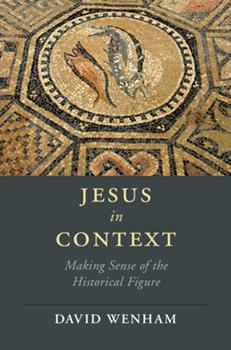Q. At the end of day, do you think John the Baptizer was originally a member of the Qumran community but then later went solo?
A. Yes, I think I do. At least I imagine that John spent some time with the Qumran community, perhaps as one of their young trainees! But then he evidently had a more specific prophetic calling to go and to summon people to prepare for the arrival of God’s promised salvation by repentance and baptism. And then came the momentous baptism of Jesus…..
Q. Few would dispute that Jesus taught in wisdom speech, or as we tend to call it—parables. The thing that has always struck me about this is that Jesus is not like the classical prophets who would preface their remarks with ‘Thus says Yahweh’ and then quote what they had heard from Yahweh. Jesus doesn’t operate like that. He’s more like the northern action prophets, Elijah and Elisha in his deeds, but in his teaching he’s more like the sages, like Solomon. It has also struck me that when Jesus is appealed to for a miracle as Son of David (a title he never directly applies to himself) this could be a reference to his being like Solomon, who in Jesus’ day was believed to have had the wisdom of cures, even exorcisms. Why do you think it is that in the discussion of Jesus’ teaching, much has been said about his parables, but little about why Jesus chose to do public teaching in a sapiential manner? Was it really so that he could make clear the hard-heartedness of his audience, or that they were alienated from God, like Isaiah’s commission? I remember the saying of Karl Barth that Jesus used parables like stones thrown through a plate glass window to shatter people’s preconceptions and notions about themselves and God. Would you agree? If so…. Modern preachers have totally misread how the parables function. They are not nice little earthly stories with heavenly meanings that only have a sort of spiritual flavor. They are actually revolutionary teaching meant to overturn our complacency and presuppositions about God and his salvation.
A. You are the expert on Jesus and wisdom, Ben, and I am sure you are right. I have just got my copy of your Jesus the Sage off my shelf and noticed some of my penciled and approving comments in the margins! Jesus was so steeped in the Old Testament and it was so basic to his self-understanding that it would be odd if he only drew on the prophets and the Psalms and if he bypassed the wisdom traditions which were so important in first century Judaism (and also early Christianity, e.g. John chapter 1, Colossians 1, Hebrews 1). I suspect that you are on the right track in your comment on parables and Isaiah 6. And I am glad to be referred to Karl Barth’s saying. When I wrote my popular book The Parables of Jesus, my subtitle was Pictures of Revolution. Curiously and to my surprise that subtitle appeared in the British edition of the book but not in the American edition: my guess is that the American publishers (to whom I am grateful for keeping the book in print!) felt that my subtitle was a bit controversial at a time when Communism and Marxism were a serious global threat! But Jesus was definitely a revolutionary, even with some things in common with Communism (e.g. the call to radical commitment), and Jesus’ parables were very challenging and radical, though the opposite of atheist with the kingdom ‘of God’ at the centre.












